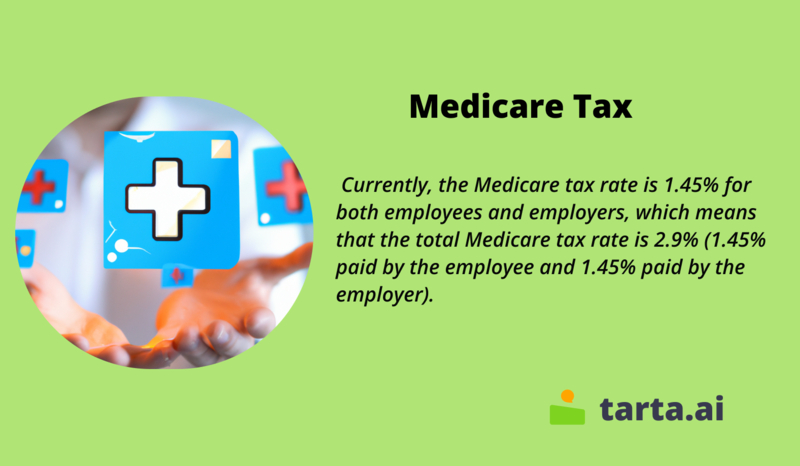Overview of Medicare Tax: What is It and Who Pays It?
What is Medicare Tax?
Medicare tax is a payroll tax that is collected from employees and employers to help fund the Medicare program. The Medicare program provides healthcare benefits to eligible individuals who are aged 65 or older, as well as to certain younger individuals with disabilities or End-Stage Renal Disease (ESRD).
The Medicare tax is a flat rate tax that is applied to wages, salaries, and self-employment income.

NOTE
Medicare tax is different from the Social Security tax, which is another payroll tax that is collected to fund the Social Security program. While both programs are administered by the Social Security Administration, they have different funding sources and benefit structures.
Who Pays Medicare Tax?
Most employees and employers in the United States are required to pay Medicare tax. Specifically, employees and employers are required to pay a flat rate Medicare tax of 1.45% on all wages, salaries, and other compensation earned by the employee. This means that the total Medicare tax rate is 2.9% (1.45% paid by the employee and 1.45% paid by the employer).
Self-employed individuals are also required to pay Medicare tax on their net earnings. For self-employed individuals, the Medicare tax rate is currently 2.9%, which is double the rate paid by employees and employers. However, self-employed individuals can deduct half of their Medicare tax as a business expense when calculating their taxable income.
NOTE
There are some exceptions to the Medicare tax requirement. For example, certain religious groups are exempt from paying Medicare tax, as are some state and local government employees who participate in alternative retirement plans. Additionally, some types of income (such as capital gains) are not subject to Medicare tax.
Overall, most employees and employers are required to pay Medicare tax as a part of their overall payroll tax obligation. The money collected from Medicare tax is used to fund the Medicare program and provide healthcare benefits to eligible individuals.
What does Medicare Tax Fund?
As it has been already mentioned, the money collected from Medicare tax is used to fund the Medicare program, which provides healthcare benefits to eligible individuals who are aged 65 or older, as well as to certain younger individuals with disabilities or End-Stage Renal Diseases (ESRD).
Specifically, the Medicare program provides coverage for a range of healthcare services, including hospital stays, doctor visits, prescription drugs, and other medical services. Medicare is funded through a combination of payroll taxes, premiums paid by beneficiaries, and general government revenues.
The money collected from Medicare tax is an important source of funding for the program, as it helps to ensure that the program has the resources it needs to provide healthcare benefits to millions of Americans. Without Medicare tax revenue, the program would be unable to provide the level of coverage and benefits that it currently offers.
IMPORTANT
The Medicare tax rate can change over time, as it is set by the U.S. Congress and is subject to legislative changes. However, any changes to the Medicare tax rate typically go through a lengthy legislative process and are often announced well in advance to give employers and employees time to adjust their payroll processes and budget accordingly.

PHOTO: Bigstock
How does Medicare Tax Differ for the Self-Employed?
- Medicare tax rate: The Medicare tax rate for self-employed individuals is currently 2.9%, which is the same as the rate for employees.
- Additional Medicare tax: Self-employed individuals may also be required to pay an additional Medicare tax of 0.9% if their income exceeds certain thresholds. This tax applies to earnings above $200,000 for individuals and $250,000 for married couples filing jointly.
- Self-employment tax: In addition to Medicare tax, self-employed individuals must pay a self-employment tax to cover Social Security and Medicare contributions. The self-employment tax rate is currently 15.3% of net earnings, although only 92.35% of net earnings are subject to this tax.
- Deductions: Self-employed individuals can deduct half of their self-employment tax from their taxable income, which can help lower their overall tax burden.
- Reporting: Self-employed individuals must report their Medicare and self-employment taxes on their annual tax returns using Schedule SE.
- Estimated taxes: Because self-employed individuals do not have taxes withheld from their paychecks, they are responsible for making estimated tax payments throughout the year to cover their Medicare and self-employment taxes. Failure to make these payments can result in penalties and interest charges.
- Medicare Tax is a payroll tax that is withheld from employees' wages and paid by employers to help fund the Medicare program, which provides health insurance to people who are 65 years or older, certain younger people with disabilities, and people with end-stage renal disease.
- The current Medicare Tax rate for employees is 1.45% of all wages earned, with no income limit. Employers also pay a matching 1.45% of wages earned by their employees.
- In addition to the 1.45% tax rate, employees who earn over a certain income threshold may be subject to an additional 0.9% Medicare Tax, which is known as the Additional Medicare Tax.
- The Additional Medicare Tax applies to wages, compensation, and self-employment income that exceed $200,000 for single filers or $250,000 for married couples filing jointly.
- Self-employed individuals are responsible for paying both the employee and employer portions of the Medicare Tax, which is currently a total of 2.9%. Additionally, self-employed individuals may be subject to the Additional Medicare Tax if their self-employment income exceeds the income thresholds.
FAQ
Who pays Medicare Tax?
Both employees and employers pay Medicare Tax.
What is the current Medicare Tax rate?
The current rate is 1.45% for both employees and employers.
Is there an income threshold for the Additional Medicare Tax?
Is there an income threshold for the Additional Medicare Tax?
Yes, it applies to income over $200,000 for single filers or $250,000 for married couples.
How is Medicare Tax different from Social Security Tax?
They are separate payroll taxes that fund different programs.
Can employers withhold more than required Medicare Tax?
No, they must withhold the correct amount or face penalties.